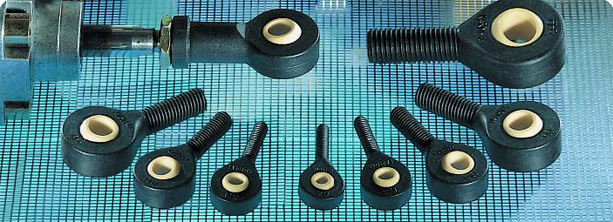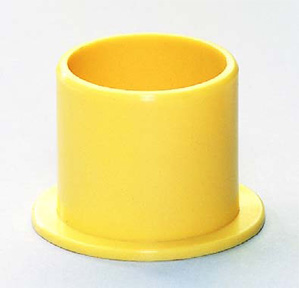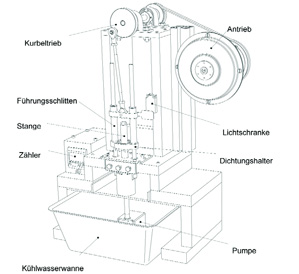
Wear inspection
How bearings assist in the inspection of pneumatic sealsPneumatic seals with low diameter were inspected for wear in the scope of a dissertation at the Institute for Machine Elements, Engineering Design and Tribiology, Hanover University. The carriage for holding the seal was finished as light as possible to achieve a low-noise operation through low mass forces. The device operates indeed only with about 500 rev./min-1, all the same the inspection device should run generally round and with minimum noise. The "KBRM-05" plastic ball heads made of the igubal® family used on the connecting rod constitute, compared to their steel peers, true flyweights and therefore are particularly well suited. As the stressing capacity doesn't turn out to be very high with friction forces of around 7 N, they also fulfill all other technical prerequisites. They have an inner diameter of 5 mm, are finished without steel housing and do not show any noticeable play after about 15 million work cycles.
The self-aligning bearing of the igubal® type series is easy to install, suits all angle variations and could replace special housing in many cases. Technically applicable in dry operations, they have excellent vibration dampening properties and are insensitive to dirt. The spherical ball of the standard spherical bearings is made of iglidur® W300, a material that distinguishes itself by the lowest coefficient of friction and extremely low stick-slip effect. The housing is made of igumid® G, an especially impact-resistant, long-fiber-reinforced polymer. igubal® products operate without problems even under difficult conditions. They are corrosion-resistant in humid or wet environments. Weak acids and alkalis cannot harm them. The application temperatures range from -30 to +80 °C. They manage without sealing even under extreme dirt accumulations - equally in fine dust or in coarse dirt.

iglidur® W300 bearings
The coefficients of glide friction of the iglidur® W300 decreases with increasing load. In the dry operation, compared to steel (Cf53), they only reduce by around 25 percent in loads between 0.5 and 3.5 MPa. Smooth shafts can lead to stick-slip effects. Shaft roughnesses of 0.4 to 0.5 μm have stood the test of time. Here the wear resistance turns out to be still excellent, and the friction assumes the lowest coefficient.
